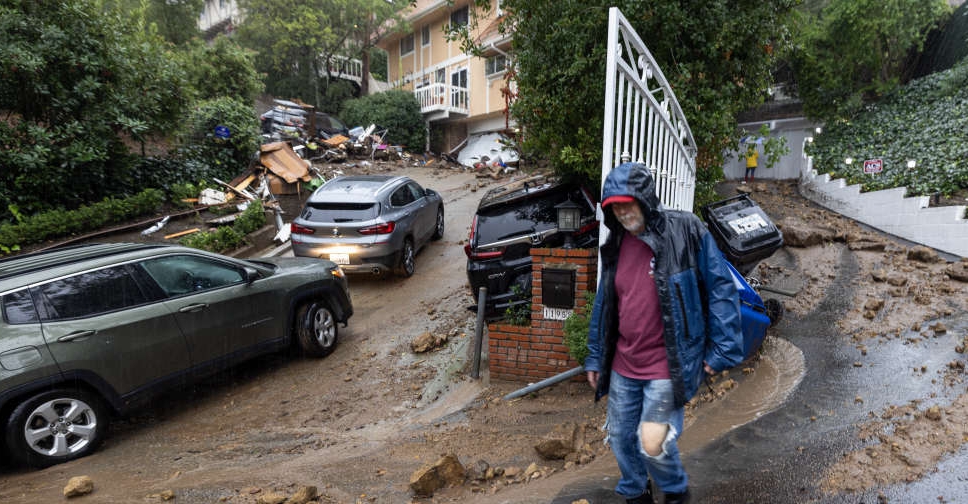
A deadly Pacific storm, the second "Pineapple Express" weather system to sweep the West Coast in less than a week, dumped torrential rain over Southern California on Monday, triggering street flooding and mudslides throughout the region.
Extreme-weather advisories for floods, high wind and winter storm conditions were posted on Monday across parts of California and southwestern Arizona where some 35 million people live, and authorities urged residents to limit their driving.
The National Weather Service documented staggering rainfall amounts from the storm, which lashed Northern California on Sunday with hurricane-force gusts of wind, along with heavy precipitation that intensified as the system moved south on Sunday night and Monday.
The National Weather Service (NWS) said more than 25 cm of rain had fallen since Sunday across the Los Angeles area, the nation's second-largest city, with much more expected before the downpour was due to taper off later in the week.
Nearly a foot of rain was measured over a 24-hour period on the campus of the University of California at Los Angeles (UCLA).
"We're talking about one of the wettest storm systems to impact the greater Los Angeles area" since records began, Ariel Cohen, chief NWS meteorologist in LA, told an evening news conference. "Going back to the 1870s, this is one of the top three."
US President Joe Biden spoke to California Governor Gavin Newsom and Los Angeles Mayor Karen Bass and pledged to provide federal aid to areas hard hit by a Pacific storm pummeling the state, the White House said.
The Los Angeles Police Department reported scores of traffic collisions with injuries since the storm began, many more than usual, while city Fire Chief Kristin Crowley said her crews had responded to at least 130 flooding incidents by Monday morning.
SECOND ATMOSPHERIC RIVER IN DAYS
The intense rainfall, with heavy snow in high-elevation mountain areas, was carried to California by a storm system meteorologists call an atmospheric river, a vast airborne current of dense moisture funneled inland from the Pacific.
The latest tempest, and a less powerful storm that hit California on Wednesday and Thursday, also qualified as a "Pineapple Express," a type of atmospheric river originating from the subtropical waters around Hawaii.
Winds gusting to 121 kph on Sunday downed trees and utility lines across the San Francisco Bay Area and California's Central Coast, knocking out power to roughly 875,000 homes at the storm's peak in that region.
The greatest flash-flooding threat on Monday centered on Southern California, the NWS said, as the system slowly pivoted and pushed farther into the interior of California, but forecasters said "catastrophic" impacts were unlikely.
HILLSIDE COMMUNITIES HARDEST HIT
A number of upscale communities built on the slopes of the Hollywood Hills, Beverly Hills and Topanga Canyon were among the hardest hit by from landslides.
Los Angeles officials reported 120 mudslides and debris flows throughout the city on Monday, and at least 25 structures damaged by heavy rainfall or mudslides as of Monday evening, Crowley said.
Rainfall rates were diminishing as the storm wore on, and last summer's Southern California wildfire season was mild compared with some previous years, leaving more hillsides and canyon walls able to withstand a heavy soaking without collapse.
Flooding nevertheless posed a considerable hazard. Rescue teams pulled dozens of people to safety statewide, mostly motorists trapped in their cars by rising waters when they tried to drive through flooded roadways, Brian Ferguson, spokesperson for the Governor's Office of Emergency Services (OES), said.
Evacuation orders were in effect for several neighborhoods at particularly high risk of flash floods and mudslides, he said.
"We're not out of the woods yet," Ferguson said. "There could continue be very dangerous impacts all through Southern California today and tomorrow."
 UK inquiry finds 'chilling' cover-up of infected blood scandal
UK inquiry finds 'chilling' cover-up of infected blood scandal
 Iranian President Raisi killed in helicopter accident, state media says
Iranian President Raisi killed in helicopter accident, state media says
 ICC prosecutor seeks arrest warrants for Israeli, Hamas leaders
ICC prosecutor seeks arrest warrants for Israeli, Hamas leaders
 Assange given permission to appeal against US extradition
Assange given permission to appeal against US extradition
 Israel intends to broaden Rafah sweep, Defence Minister tells US
Israel intends to broaden Rafah sweep, Defence Minister tells US




